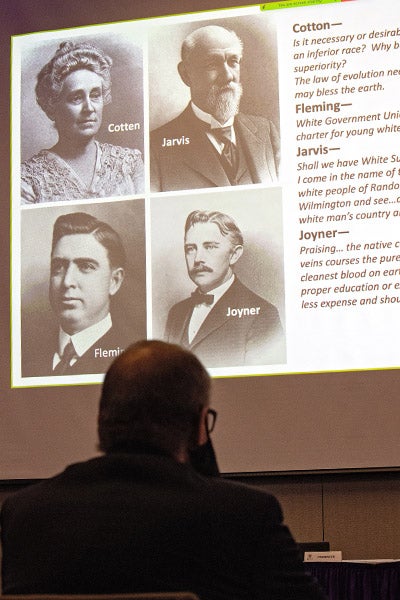WHAT’S IN A NAME
Board requests set of standards for renaming
The East Carolina University Board of Trustees received a recommendation from an ad hoc building name committee regarding the renaming of several campus buildings, but requested further clarification on standards for future renaming decisions during its regular meeting Feb. 12.
Interim Chancellor Ron Mitchelson presented the committee’s report, which recommended the removal of four names from campus buildings — Joyner, Jarvis, Fleming and Cotten — and that the name of Robert H. Wright be retained. Under the committee’s recommendations, Jarvis Hall would become Pamlico Hall, Fleming Hall would become Currituck Hall, Cotten Hall would become Albemarle Hall, Joyner (West) Library would become Main Campus Library, and Joyner East would become School of Communication.

The ad hoc building name committee recommended the removal of four names from campus buildings.
The report outlines both the contributions to ECU and the community of Sallie S. Cotten, James L. Fleming, Thomas J. Jarvis and James Y. Joyner, as well as the racist views they espoused in speeches and writings. Mitchelson presented quotes from each that contrast with the ECU Creed.
“To me, there’s just a clear contrast between what we say our values are and what the values of these individuals were,” he said.
Mitchelson also pointed out that approximately half of the population of the region ECU serves is Black. He said the university has made progress in recent years, but the makeup of the student body, staff and faculty do not reflect the demographics of the region. Removing the names is one part of a comprehensive effort to ensure that ECU is a welcoming, inclusive place, he said.
Several board members, along with Vern Davenport, chair, agreed that the views of the buildings’ namesakes do not represent what ECU is today, but asked for more guidance, including a set of standards on how to address current and future naming concerns.
“It was my charge that we deal with this comprehensively and conclusively, so that we wouldn’t continue to get paper-cut with issues being raised …” said Davenport. He said he’d like to reach a point where there’s a clear standard, where “we’ve evaluated every naming convention on our campus against that standard, we can make a recommendation of how to deal with that, and we move on.”
The board also asked the committee to ensure that all names on campus have been considered and to evaluate options for the establishment of a physical space for Heritage Hall, which is intended to acknowledge people of historical significance to the university in an authentic and comprehensive context.
“It has always been our intention as a board to establish a physical location for Heritage Hall, and … it’s time to evaluate our options, whether it is the lobby of Whichard Building or the Dail House or some other existing place on our campus,” said Davenport.
The board approved a motion requesting the additional information by March 31 and will consider the issue at its next regular meeting in April.
In other business during the board’s full and committee meetings:
- Chris Locklear was appointed as chief of staff for the incoming chancellor, Dr. Philip Rogers.
- A conference room in the Main Campus Student Center was named in honor of Leahmarie Gottlieb and Gigi Curtin; the President’s Suite in the Taylor Slaughter Alumni House was named in honor of Don Leggett; and the foyer of the Taylor Slaughter Alumni House was named in honor of Harry Stubbs.
University Affairs Committee
Interim Provost Grant Hayes and Vice Chancellor of Student Affairs Virginia Hardy provided an update on COVID-19 and applications for the fall 2021 semester.
Hardy mentioned that more than 5,000 students had been tested for COVID-19, with a positivity rate of just 1.8%. As of Thursday, just 14 students were in quarantine or isolation. She also pointed out that the number of large gatherings of students off campus is down compared to the fall semester.
“Compliance is a lot better now,” she said.
Hayes pointed to lessons that were learned from the fall semester that are helping with keeping the number of COVID-19 cases low this spring. About 32% of all undergraduate courses are being taught in person in classrooms where seating capacity is limited to one-third or less.
“ECU is open for business,” he said. “The campus is open for students, and those students will get a great education at ECU.”
Hayes said that ECU had received 21,410 freshmen applications for the fall semester, already 1,097 more than last year’s record total. The deadline to apply is April 1. He said transfer applications have also increased from last year.
“We’re on target to welcome a very healthy freshman class this fall,” he said. “… In light of the pandemic, the report is quite positive.”
Research and Economic Development Ad Hoc Committee
This summer, officials expect visible signs of construction as renovations begin at the Export Leaf, Pritchard Hughes and American Tobacco Co. buildings as part of the Intersect East project along 10th Street. The project will create space for industries, businesses and regional organizations to collaborate with faculty, staff and students to create innovative solutions to problems and challenges.
Audit, Risk Management, Compliance and Ethics Committee
During the board’s Audit, Risk Management, Compliance and Ethics Committee meeting, Kitty Wetherington, associate vice chancellor for human resources, shared several wellness initiatives for employees, which has been important during the ongoing pandemic. The initiatives include ComPsych, an employee assistance program which offers in-person and virtual counseling, webinars and articles; a revamped Employee Wellness Institute; and systemwide COVID-19 resilience resources.
Wayne Poole, chief audit officer, presented on planned and current internal audit areas including pandemic relief funding of $19.7 million in higher education emergency relief funds; $15 million appropriated to the Brody School of Medicine for COVID-19 research; and $4.3 million for other COVID-19 related expenses.
Finance and Facilities Committee
Stephanie Coleman, interim vice chancellor for administration and finance, said another round of assistance called HEERF (Higher Education Emergency Relief Fund) has been announced. The new funds can be used to help defray expenses associated with the pandemic and provide more flexibility than previous federal funds. ECU has been approved for about $30 million in HEERF funds.
Coleman also shared that ECU received an unqualified opinion from the state auditor for fiscal year 2020, meaning ECU’s finances were fairly and appropriately presented, without any identified exceptions, and in compliance with generally accepted accounting principles. Total revenues were $976.3 million with 33% coming from state appropriations; total expenses were $930.1 million, with salaries and benefits making up 65%. The largest area for operating expenses by function are auxiliary enterprises, which includes ECU Physicians and campus housing and dining, followed by instruction.
Bill Bagnell, associate vice chancellor of campus operations, updated committee members on designer selections for two projects: restroom alterations for ADA code compliance in the Rivers Building awarded to MHAworks; and the Science and Technology Building classroom roof replacement awarded to Raymond Engineering. Affiliated Engineers Inc. of Chapel Hill was selected for the main campus steam and condensate project at Building 43.
In an update on several capital projects, Bagnell said occupancy for the $90 million Life Sciences and Biotechnology Building is expected in late September or October. Construction should start on the Mendenhall Phase 1 project in March, and work on the Isley Innovation Hub is underway. The high-rise code compliance stair addition at the Brody School of Medicine is at closeout.
Projects over $750,000 must go to the UNC Board of Governors for approval, and ECU will present one project at the BOG’s Feb. 17-18 meeting. The health sciences campus heat plan deaerator tank is expected to cost $935,000.
Health Sciences Committee
Dr. Mark Stacy, dean of the Brody School of Medicine and ECU’s vice chancellor for health sciences, discussed the competitiveness of ECU’s Division of Health Sciences and highlighted the division’s effectiveness in utilizing the $15 million in CARES Act funding it received from the North Carolina General Assembly.
Dr. Jason Foltz, chief medical officer of ECU Physicians, gave an update on ECU’s COVID-19 vaccination efforts, which were conducted in collaboration with Vidant Health, the Pitt County Health Department, Physicians East and ECU’s Student Health Services. ECU has been approved by the state to receive its own supply of vaccine, Foltz said, which could happen as soon as March. Until this point, ECU Physicians has been administering vaccine doses provided by Vidant Health. During this time, zero vaccine doses were wasted at the ECU Physicians vaccination clinics, Foltz said.
Dr. Herb Garrison, interim president of ECU’s Medical & Health Sciences Foundation, provided an update on the foundation’s impressive ability to adapt to a changed fundraising environment despite the challenges presented by the COVID-19 pandemic and subsequent economic crisis.
Natalie Broder, a master of public health student and president of ECU’s Public Health Organization, talked to the Board of Trustees about why she chose to pursue her education at ECU and why she is interested in serving the general health of North Carolinians and addressing health inequities in the state.
